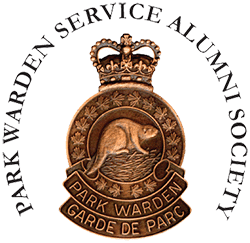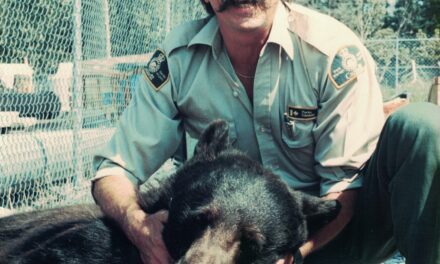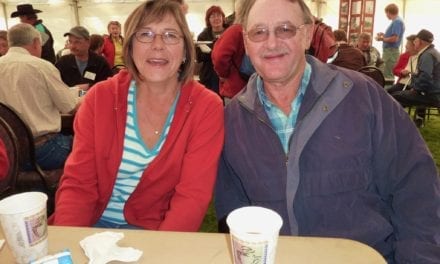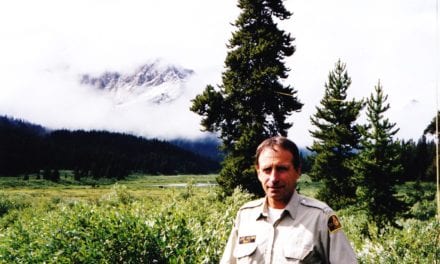(59:03) Pat – Bob was offered, he didn’t seek Kluane. He was called and asked if he would go to Kluane. That sort of more suited his loves. But Newfoundland was an interesting and good experience for our family…In Newfoundland in our area the unemployment rate was 60% or something. There was a lot of poverty there. The girls met children who really didn’t have anything. They didn’t have much and their parents didn’t have jobs. They were young, but even they could see that little Tina, didn’t have a lot of extra at home and things like this. I think it was really good for them. Then when we moved to the Yukon, for me my year of adjustment had kind of been in Newfoundland. I was so homesick for Jasper and my parents were on the other side of the country and my grandmother died. I was just sort of getting used to being away and all of a sudden we were moving to the Yukon. So it was a very short period of adjustment in the Yukon for me. Partly because the Yukon is so unique. Almost everybody is from somewhere else. We only stayed two years. Then Bob was called and asked if he wanted Banff. But I think that we would have become lifers there.
(1:00:32) Bob – Well, it was a competition.
(1:00:33) Pat – Yeah it was, but you were asked to apply. But the schooling was a bit of an issue. Colleen was in a younger class and there were 18 children her age. It was a fairly good sized class. In Tara’s there were about six or seven and it was a multicultural thing, which was good for in her in elementary school, but academically it was going to be weak. We even debated about private schooling and things. But the bottom line is you really only have your children for such a short time before they are off seeing the world, you know. And the thought of a private school just didn’t sit with me.
(1:01:12) Bob – Pat subbed quite a bit in Newfoundland.
(1:01:16) Pat – I subbed a lot in Newfoundland.
(1:01:18) Bob – Obviously when we got to Newfoundland it was a little slow in September, October and then all of a sudden it took off and she was requested to teach. You get freezing rain there and I remember we could only get in the car through the backdoor.
(1:01:36) Pat – It was a station wagon.
(1:01:18) Bob – And boot the door from the inside so that the ice would break on the outside.
(1:01:42) Pat – None of the park houses in Newfoundland had garages because we were supposed to fit in, and most people did not have garages. I’m telling you, you have no idea. I really did curse that policy when I would be crawling into the car through the back end, the hatch. Well, they took the bus. (In response to the comment, “Especially with children.”) The town was so spread out around the bay and they came home for lunch on the bus. The education system is a whole other story…
(1:02:18) Pat – Then when we moved to the Yukon I was subbing a bit. But there were two women who shared a position. They were pregnant and due within two days of each other. I was begged to take the job starting in March. That got me into the system. Then I taught half time the next year because one of the teachers came back and the other one didn’t…Actually it was funny because in our move to Newfoundland, one of the things I did to fill my time was I studied French. I was really surprised about how much French I knew when we were in Quebec. When we moved, we stopped in Quebec City and I thought, “Whoa, I could probably get my French up.” So I studied French by correspondence and one of the positions available was the French teacher. I studied more, I studied like crazy and I went to Quebec that summer. So I felt pretty good about my skills, by the time I took over the position in the fall.
(1:03:30) Bob – Which served you well here.
(1:03:32) Pat – Because that it how I got my job in Canmore. You kind of have to believe that things are unfolding as they should. I can’t say that I cried when I left Newfoundland. But I did shed tears leaving the Yukon because it is a very special place. I think I always saw Newfoundland as somewhat temporary.
(1:04:01) Bob – We didn’t drive back, we shipped our vehicle when we went to the Yukon. So when I got off the plane in Calgary actually I got down and kissed the ground! Nothing against Newfoundland. You can take the boy out of western Canada, but you can’t take western Canada out of the boy!
(1:04:24) Pat – We acquired our husky in Newfoundland. That is probably another one of his big regrets that we ever got a husky. But the girls and I loved him, even though he was all husky! He never really got trained or anything.
(1:04:43) Bob –As an Area Manager I got to know people, especially the regional office warden officer, operations officer, Jimmy Simes. He was a great, great guy. He and I just kind of struck a chord somewhere along the line. So I helped him, as well as many other wardens, but I spent quite a bit of time with Jim and then later Brian MacDonald, interviewing young potential wardens.
(1:05:26) Bob – The town of Jasper went through a planning process. There were regional planners there. So on my own time I went and got involved with planning the town and I got to know the town’s people quite well. I joined the fire department. Somewhere along the line, I am not sure where it occurred, I was getting known for community involvement.
(1:05:49) Bob – As it turned out, George Balding showed up as Superintendent in Jasper and he gave me an opportunity to act as Visitor Service Manager for a year and a half while we had a vacancy. Doug Wellock moved up to acting Assistant Superintendent. So that was a great experience and really I didn’t go back and work in the warden service. We went right from that position to Newfoundland to the first chief park warden job that I had, although I had acted for Don Dumpleton a few times. That was really the big transition, after 16 years leaving Jasper and going out. I think it was pretty bold of many of the people (like) Paul Galbraith and many of the western wardens who went to Newfoundland. Everybody did a great job, but it was a different environment.
(1:06:54) Bob – The one thing I did like about Gros Morne, we were into a federal provincial agreement so that was the only park that I was ever in that we had an emergency meeting to figure out how fast we could spend our money, as opposed to figuring out that we were broke! That only lasted for so long. But it was just a great experience. There had been lots of work done on resource management concepts. But law enforcement was a stretch because these folks, likely some of them, had the park forced down their throats. The fishing industry, the cod industry was still kind of there, but dying so there was a lot of issues. In the last 15/20 years that park has now become the economic engine of that part of the west coast of Newfoundland. So you look at it and say, “Well I was part of it, and this worked well.” It was an interesting experience. But like I say, before we had decided to go to Newfoundland there was a concept that I would go to Kluane when Larry Tremblay retired. Larry was trying to figure out when he wanted to retire and that was fine. We went to Newfoundland and then a year later Larry does retire and the Superintendent was Charlie Zinkan who I knew through some of the land management, resource management concepts in Jasper. Then Charlie and Maryanne went out to PA (Prince Albert National Park). He was the Visitor Service Manager there and we used to see them off and on. So we had this rapport and he said, “If you are still interested, do you think that they would release you?” We asked the question and that worked out.
(1:09:12) Bob – We came all the way back across Canada to Kluane. What a lovely park. There were lots of management issues. A great group of people, but again that sense of community, that everybody needed each other. Haines Junction was an interesting little community. It had a wide variety of people from the aboriginal, South Tutchone people to gold miners.
(1:09:42) Pat – And what was the name of the motorcycle guy?
(1:09:44) Bob – Oh, Yorg.
(1:09:46) Pat – In muscle shirts, he would have probably been shot in Newfoundland!
(1:09:48) Bob – He was our store’s man.
(1:09:54) Pat – He looked pretty wild! But everybody was accepted in the Yukon. I think that is what I found so wonderful about it.
(1:10:01) Bob – You met everybody, you’d shake hands and immediately they would ask you where you were from and what your skills were. And what you could take over and run in the community. It was a great two years and I suppose if there was ever a park that I thought maybe we left a bit early, it was Kluane. There is always a saying in the Yukon, “If you stay there for longer than five years you are a lifer.” Definitely there are lots of examples of that.
(1:10:40) Bob – Then Banff of course was going through a transition with managers.
(1:10:45) Pat – I just want to add something else about the Yukon and this passing by. When we were there Willi Pfisterer (alpine specialist) retired in Jasper and got his goldmine in the Yukon. So we actually had quite a bit to do with him in the summer. He would come to our place and do his laundry when he came in to get his supplies. We got to know Willi. Bob knew him really well just through work and I knew him, but not the same way I knew him just sitting around our kitchen table talking. And the kids got to know him, so that was kind of fun. It just seemed that people who had been important in our lives would pop up again and again and I loved that.
(1:11:29) Bob – One of the interesting things is that Charlie Zinkan and I and a couple of the other managers were struggling with, there were about three different concepts of trying to get the Yukon native land claims started. It was going to have a significant impact on Kluane National Park. As we know, there was the early 1970s agreement, but land claims were always an outstanding issue. It was interesting working with some of the wardens and other staff that had been there right from kind of the get go in the early 1970s. To change them around to working with the negotiations and realizing that these folks, these aboriginal folks definitely had a right. I think that really was one of the turning points, being able to be flexible as a manager and trying to look at all the different views. I found that challenging at first, but really rewarding…Charlie Zinkan and I have had many discussions and he had the same feeling because it was a huge deal. We were long gone by the time it came to fruition, four or five years later. But I always look at that as having been part of the process. And I think that most people are better off for it.
(1:13:24) Pat – I really appreciated our children being exposed to that cross cultural situation. In the school, the native children, the first nation’s kids and our kids mixed beautifully. I don’t know why it was so different there than in other places. In the first place there were no reserves there right. But they just were a strong progressive group of people. Well spoken and great senses of humor. They all had their gifts. Our girls are very progressive I think and tolerant, as your generation is. I mean it would be expected. But I think that that helped sew a few seeds too about tolerance and understanding issues from other points of view. So I really appreciated that aspect of the Yukon as well.
(1:14:28) Pat – I should tell you, this is a funny story…We had only been in Newfoundland about a year and I was very apprehensive about moving again. I think it is not easy for children to keep moving. Colleen loved adventure and new things and Tara just liked her best friend and comfort. So Bob did some fast talking about Kluane. I said, ‘I understand that there are a lot of bears around where we will be living.” Because we were going to be living out at the farm. He said, “No, there is not a bear within miles of that farm because people have guns.”
(0:15:05) Bob – This was at the old agricultural research center.
(1:15:06) Pat – So there was that aspect. And then I had never been to Haines Junction and Bob had. It sounded pretty small when you read everything about it. I said, “What is available for us as a family and the kids.” “Oh” He said, “It’s a perfect road. It takes an hour to get to Whitehorse. So what isn’t available in Haines Junction is available in Whitehorse, no problem.” And how far out of town was the farm? “It was a kilometer.” Also when we had left Jasper, we, mainly Bob, I was the supervisor had built a house. A brand new, quite large house in Jasper. When we moved to Newfoundland we had lost 900 square feet and a garage. I said, “Bob, it sounds like a really small house. It is only 800 square feet.” He said, “Oh, yeah but the basement is totally finished.” Then he gets there ahead of me. I came out to Calgary, but Bob when he came to Calgary he moved on and I stayed with my parents. The kids and I stayed for a little while. So he got to see the house. I said, “How far is it out?” Well it was more than a kilometer. And the house? He said, “Oh no the basement is totally finished.” I said, “What is on the basement floor?” He said, “Oh, it’s good. It is really good.” I said, “Well is it carpet or is it tile?” He said, “Well, it is paint, but it is fresh paint!” So then when I arrived with the girls, he picked me up at the airport and we are heading back to Haines Junction which is an hour away. The road was under construction and it had been raining. They had some piece of equipment, it wasn’t a tow truck, it was a grader. It had to pull individually each car up the hill because you couldn’t move in this muck. It took us something like three hours or three and a half hours to get from Whitehorse to Kluane.
(1:17:13) Bob – Then she started recording, it was actually two miles into town.
(1:17:13) Pat – Two miles instead of one kilometer. And it was pitch black by the time we got there and in the Yukon in August that is saying something about the long trip from the airport! It was not an hour. And Bob said, “There, that is Haines Junction.” And I said, ‘I missed it!” I missed it completely we were already back on the Alaska Highway! I was doing something for the brief second that we flashed through Haines Junction. It was late when we went to bed and the next morning we went for a walk right after breakfast and not 100 meters behind our house was this enormous pile of bear poop! I said, “I thought there were no bears! How are the girls going to play outside?” I wasn’t that eager to move again so soon, but it really took me no time at all to fall in love with the Yukon. So his stories I guess were okay. And actually it was only about an hour and a half to Whitehorse when you weren’t slipping and sliding in the mud on the road. Haines Junction was self contained too because as Bob said, it is a small community and you made your own entertainment and it was very family oriented. It was a wonderful community to be in.
(1:18:33) Bob – It was a huge, huge contingency of government because there was highways, health was there and the school. The national park of course was a big driver for that area.
(1:18:50) Bob – In 1988. (In response to the question, “What year then did you move to Banff?”) I came down in April.
(1:18:58) Pat – And you came down in February when the Olympics were on for a meeting or something.
(1:19:00) Bob – Yeah, I came down then. Jillian Roulet was the Assistant Superintendent and Dave Day was Superintendent. I had an interview in January in Winnipeg and then I came down in February to look at the park. I knew what was here basically.
(1:19:25) Pat – Well you know, I don’t like the idea of change. But given what we went through I think I accepted it fairly well. When we arrived in Banff we were in the duplexes on Squirrel Street and it was July 1 when I arrived with the girls. There were two or three buses that were right in front of our house unloading Japanese tourists, all with about three cameras around them. There was just noise and activity and I had just come from the farm where the Saint Elias range was right in front of me. (In response to the question, “Were you happy to come to Banff?”)
(1:19:57) Bob – I think that I was more enthusiastic, than Pat!
(1:20:00) Pat – There were otters right outside our house in the creek.
(1:20:03) Bob – It was a huge step for an individual in the warden service like myself because it was a very important job and promotion (to become the chief warden of Banff National Park).
(1:20:14) Pat – And true to form I did accept it. My parents were not that elderly when we got here. They volunteered at the Olympics. They were probably standing next to your parents. They grew old while we were here and it was handy for me because I was able to assist them. Also the girls and mom and dad were very close, weren’t they?
(1:20:38) Bob – And my mother was not doing very well either. So it kind of helped at that end of it. So we got here and things really improved when we bought this house about 14 months later. The girls were pretty well set up and the schooling system was great.
(1:20:59) Pat – Excellent, excellent schooling system.
(1:21:02) Bob – Banff was going through some exciting times…management plans, town incorporation was going on. Then of course Banff was the media outlet for every little thing that happened. We were making some really nice headway on bear management by that time. Jasper had actually containerized their garbage before we left, but they were just kind of getting to it here. Kananaskis Country and Canmore were getting public input into their development plans. The Alberta Natural Resource Conservation Board was reviewing development in Canmore. It was an exciting ten years and busy. The girls were quite mobile. They were involved with the horse club. We got the girls involved with horses. We really did maximize that. And maybe we were a bit greedy getting out in the backcountry!
(1:22:11) Pat – Our girls have been on almost every trail in the park, which was wonderful.
(1:22:17) Bob – Which we did in the Yukon too. Gros Morne to a lesser extent. But we were out and about and Banff was great.
(1:22:26) Pat – It didn’t take me long. The hiking around Banff is superb. You get to it quickly. You get into the alpine country quickly which has always been my favorite area to wander around in. But it was just that July 1. There was a little culture shock that weekend for me. From this pristine wilderness area around Kluane to Squirrel street!
(1:22:52) Bob – It was a bit of a transition. Parks management of course was going under review again. The warden service was doing a multitude of things that Parks Canada should have been thinking about, farming out and separating out long before. In my 30 year career it seemed to be if something new came along and in those days it was always likely resource conservation protection concepts, you were in as being a partner working with other agencies trying to resolve it. Unfortunately a lot of the time was spent saying “No, you can’t do that.” And a lot of people didn’t like to hear that. Then of course the very last part of it was when Tom Lee, rightly or wrongly was trying to change things. They basically changed the interpretation system, gave them much less of a role.
(1:24:03) Bob – Some of the positive things in resource management was the fire management plan with people like Cliff White and Ian Pengelly here. We really built a program that was cutting edge and obviously had people edgy! But we did some good work and that crew carried it on working with the province trying to get a lot of those folks online from bear management and wildlife management through to fire management.



